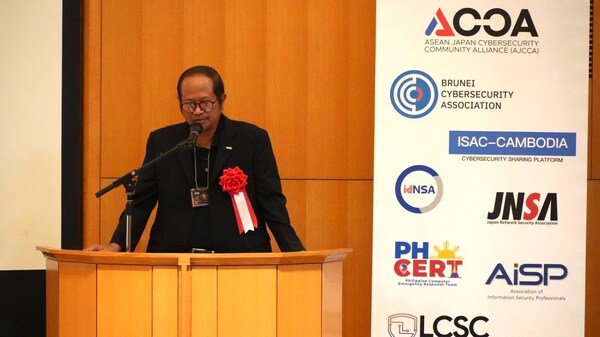 |
TOKYO, Oct. 23, 2025 /PRNewswire/ — As cyberattacks grow more complex and global supply chains face rising digital risks, leaders from across ASEAN and Japan gathered in Tokyo for the 2nd AJCCA Conference 2025 in Tokyo, reaffirming their shared commitment to building a safer and more resilient digital future.
Hosted by the ASEAN-Japan Cybersecurity Community Alliance (AJCCA) in partnership with the Japan Network Security Association (JNSA), the event was held at Ichijo Hall, Yayoi Auditorium, The University of Tokyo, under the theme “Securing the Future with AI-Driven Cybersecurity and a Resilient Supply Chain.”
A Call for Regional Unity in the Face of Escalating Cyber Threats
Opening the conference, Yoichi Iida, National Cyber Director of Japan, warned that ASEAN and Japan have become some of the most frequently targeted regions for cyberattacks worldwide. He cited the ransomware incidents that hit Nagoya Port and Asahi Group Holdings as stark reminders of the economic disruption such attacks can cause.
Iida urged stronger coordination between governments and private sectors, emphasizing that “no single country or organization can fight these threats alone.” He called for a new model of collective cyber defense that crosses national and institutional boundaries.
AJCCA’s Framework: Collaboration, Capacity, and Connectivity
Rudi Lumanto, Chairman of AJCCA, outlined the alliance’s guiding vision of three pillars — Collaboration, Capacity, and Connectivity — as the foundation for regional cyber resilience.
He explained that collaboration must go beyond information sharing to foster “synergistic programs and shared strategies.”
Capacity, he added, should harness AI to detect anomalies, predict threats, and automate response systems.
Connectivity, meanwhile, must ensure the security of entire supply chains — an urgent lesson from the Kaseya ransomware attack, where one weak link affected hundreds of organizations.
Japan’s Approach: Securing the Digital Economy
Toshikazu Okuya, Deputy Director General, Commerce and Information Policy Bureau at Japan’s Ministry of Economy, Trade and Industry (METI), outlined Japan’s latest initiatives to counter new forms of cyber risk emerging in the AI era.
Referencing high-profile incidents like the ransomware attack on KADOKAWA, Okuya highlighted efforts such as the Cyber-Physical Security Framework (CPSF) and Software Bill of Materials (SBOM) to enhance global supply-chain transparency. He also reaffirmed Japan’s commitment to supporting SMEs and advancing collaboration with ASEAN countries to create “a safe and robust digital society.”
Voices from ASEAN: Co-Development and Future Readiness
A dynamic panel discussion brought together senior officials from ASEAN governments and AJCCA leadership to discuss collective development and next-generation defenses.
- Cambodia’s Phannarith Ou, Director General of MPTC emphasized the importance of community-based cyber resilience, integrating schools, SMEs, and civil society into the cybersecurity ecosystem.
- Malaysia’s Megat Zuhairy bin Megat Tajuddin, Chief Executive of NACSA called for ASEAN and Japan to act “as one nation” in developing shared technologies and training programs.
- Thailand’s Amorn Chomchoey, Secretary General of NCSA noted the high cost of Western security products and voiced his aim to co-develop more affordable, effective defense tools with regional partners.
- Singapore’s Ong Kok Wee, Assistant Chief Executive (Policy and Corporate Development), CSA urged proactive measures against the misuse of AI and underscored the need for research into quantum encryption and other advanced technologies.
Honoring Cybersecurity Champions: The ACRA Awards
The evening reception at the Royal Park Hotel featured the AJCCA Cyber Resilience Awards (ACRA) — recognizing individuals across ASEAN and Japan who have made remarkable contributions to advancing national and regional cyber resilience.
2025 ACRA Awardees:
- Brunei: Muhammad Azizul Amir bin POKPADPS Awg Hj Hasrin
- Cambodia: Ren Phary
- Indonesia: Muhammad Nuh Al-Azhar
- Japan: Masahiro Shimomura
- Lao PDR: Sengxay Xayachack
- Malaysia: Ir. Dr. Megat Zuhairy bin Megat Tajuddin
- Philippines: Dr. Marlon I. Tayag
- Singapore: Prof. Alex Siow
- Thailand: Dr. Kumpol Sontanarat
- Vietnam: Vu Ngoc Son
- Special ACRA Award: Dr. Yoichi Shinoda (Japan)
A Stronger Digital Alliance for the Future
As the conference concluded, participants reaffirmed AJCCA’s role as a cornerstone platform for regional cybersecurity cooperation — a bridge connecting governments, industry, and academia across ASEAN and Japan.
Looking ahead, AJCCA pledged to continue strengthening its network and expanding collaboration to tackle emerging challenges such as AI misuse, critical-infrastructure protection, and supply-chain security — ensuring a trusted and resilient digital ecosystem for the region.
Contact
ASEAN Japan Cybersecurity Community Alliance (AJCCA)




